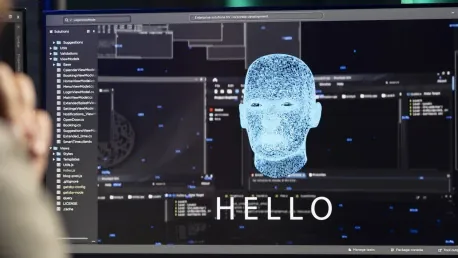Artificial intelligence is rapidly evolving and is poised to bring about significant changes in various industries. One of the fields where AI’s impact is most keenly felt is software development. The evolving role of AI in this sphere raises intriguing questions about productivity, creativity, and the shifting landscape of software engineering. This article explores the transformative potential of AI in software development, delving into current tools, future paradigms, educational avenues, and business implications.
Current AI Tools Enhancing Developer Productivity
Automating Repetitive Tasks
In the software development domain, automation through AI is proving to be a significant game-changer. Tools like GitHub Copilot automate repetitive coding tasks, allowing developers to focus on more creative and complex endeavors. This automation extends beyond mere code generation, encompassing functionalities such as code suggestions, documentation generation, and even preliminary debugging. Initially, AI automation was met with skepticism, with some developers questioning its reliability and accuracy. However, the continuous improvement of these tools has shifted the narrative. Many developers now acknowledge the value of automation in reducing mundane tasks, which, in turn, leads to increased overall productivity.
The practical benefits of automation are multidimensional. Beyond simply saving time, AI-enabled automation also reduces the cognitive load on developers, allowing them to dedicate mental resources to higher-level problem-solving. Furthermore, by handling routine coding tasks, AI tools help minimize human error, ensuring more consistent and reliable code. Over time, as these tools gain more nuanced understanding and capabilities, they become indispensable assistants to developers, enhancing their efficiency and enabling them to tackle more ambitious projects.
Real-Time Coding Assistance
Modern AI tools provide real-time coding assistance, offering suggestions and corrections as developers write code. This interactive approach is more than a mere spell-checker for code; it actively learns from the developer’s style and previous projects to provide context-specific help. Examples like GitHub Copilot illustrate how real-time assistance can accelerate the development process. By suggesting code snippets and functions based on the context of what the developer is working on, these tools enable developers to write cleaner, more efficient code at a faster pace.
Real-time coding assistance not only boosts productivity but also serves as an invaluable learning tool for developers. By observing the suggestions made by AI, developers can learn new coding techniques and best practices, which they can incorporate into their skill set. This symbiotic relationship between human and machine fosters a more productive, educational, and streamlined development environment, ensuring that both parties contribute their strengths to the ultimate goal of producing high-quality software.
Shifting Developer Roles in an AI-Driven Landscape
From Coders to Curators
The advent of advanced AI tools is gradually shifting the role of developers. Instead of writing every line of code, developers are increasingly guiding AI systems through the coding process. This paradigm shift from coder to curator involves an emphasis on problem-solving and creativity rather than solely on coding skills. As curators, developers must understand the broader problem they are solving and be able to direct the AI’s efforts towards viable solutions. This emerging role requires a blend of technical knowledge and strategic thinking, marking a significant evolution in the software development profession.
The transition from coder to curator also comes with new responsibilities and learning curves. Developers will need to become adept at understanding AI’s capabilities and limitations and must be able to seamlessly integrate AI into various stages of the software development lifecycle. The ability to critically analyze AI-generated code, provide context-specific inputs, and ensure that AI tools align with project requirements will become essential skills in the future landscape of software engineering. This shift not only enhances the efficiency of the development process but also elevates the role of developers to one that involves more strategic oversight and decision-making.
Embracing Complexity
Despite their growing capabilities, AI tools are still limited in handling highly complex and context-intensive coding tasks. These tasks often require a nuanced understanding of the problem domain, user needs, and intricate system interactions—areas where human insight is indispensable. Developers need to strike a balance between leveraging AI for routine tasks and applying their expertise to solve more intricate challenges. This balancing act entails understanding when to rely on AI and when to intervene manually, ensuring that the final product meets the desired standards of quality and functionality.
The ongoing advancements in AI technologies are expected to lessen these limitations over time, but for now, the human touch remains crucial in navigating complex development scenarios. Developers must stay vigilant and maintain an active role in overseeing AI’s contributions, ensuring that the integration of AI does not compromise the depth and quality of complex software solutions. Embracing this complexity requires a continual process of learning, adapting, and refining the symbiotic relationship between human developers and AI, ultimately leading to a more robust and innovative software development process.
Educational Pathways to AI Proficiency
Online Learning Platforms and Certifications
With the growing importance of AI in software development, gaining proficiency in AI technologies has become essential for developers. Numerous online learning platforms such as Coursera, edX, and Udacity offer courses and certifications that cover a wide range of AI topics, from basic machine learning principles to advanced deep learning techniques. These educational resources provide flexible learning opportunities for developers at various stages of their careers. By engaging in these courses, developers can build foundational knowledge and practical skills in AI, positioning themselves for future success in an AI-driven landscape.
These online platforms often feature courses developed in collaboration with leading universities and industry experts, ensuring that the content is both up-to-date and relevant. In addition to theoretical lessons, many courses include practical assignments, allowing developers to apply their newly acquired skills in real-world scenarios. Moreover, obtaining certifications from renowned institutions can bolster a developer’s credentials, making them more attractive to potential employers and enabling them to take on more specialized roles within their organizations.
Hands-On Experience and Interactive Environments
While theoretical knowledge is crucial, hands-on experience with AI tools is indispensable for truly mastering the technology. Interactive learning environments and practical projects provide developers with the opportunity to apply their knowledge in real-world scenarios, reinforcing their learning and enhancing their problem-solving abilities. Platforms that offer interactive coding environments, such as Kaggle and Google Colab, enable developers to experiment with AI algorithms and datasets in a practical and engaging manner. These experiences are vital for gaining the confidence to integrate AI tools into their daily workflows.
Hands-on projects often simulate real-world problems and challenges, allowing developers to gain a deeper understanding of how AI can be applied to solve specific issues. Additionally, these interactive platforms offer community features, enabling developers to share their work, receive feedback, and collaborate with peers. This collaborative aspect not only enriches the learning experience but also helps developers build a network of like-minded professionals passionate about AI. By immersing themselves in practical and collaborative environments, developers can hone their skills and stay updated with the latest trends and advancements in AI technology.
Aligning AI with Customer and Business Needs
Customer-Centric Development
For AI implementations to be successful, they must align with customer needs and business goals. Developers should prioritize features and functionalities that provide tangible benefits to both internal and external customers. This customer-centric approach ensures that AI tools are utilized in ways that enhance user experiences and drive business value. Understanding customer pain points and requirements is key to identifying opportunities for AI-driven enhancements. By focusing on areas where AI can make a meaningful impact, developers can maximize the returns on their AI investments and deliver better products to their customers.
Customer-centric development involves continuous communication and feedback loops between developers and users. By actively engaging with users and stakeholders, developers can gain valuable insights into how AI can be leveraged to address specific needs and improve overall satisfaction. This iterative process not only leads to more effective AI implementations but also fosters a culture of innovation and responsiveness within the organization. As a result, businesses can build stronger relationships with their customers, ultimately leading to increased loyalty and long-term success.
Securing Executive Buy-In
Successfully integrating AI into an organization’s software development processes often requires gaining support from leadership. Demonstrating the business value of AI, such as improved productivity and competitive advantages, is crucial for securing executive buy-in. Metrics and case studies that highlight the positive impact of AI on workflows and outcomes can be persuasive in convincing leadership to invest in AI skills and tools. Furthermore, aligning AI initiatives with the organization’s broader strategic goals ensures that these efforts are recognized as integral to the company’s success.
To effectively secure executive buy-in, developers and managers should present a clear and compelling business case that outlines the potential benefits and returns on investment. This may include data on how AI can streamline operations, reduce costs, and enhance product quality. Additionally, showcasing successful AI implementations within the industry can help illustrate the practical advantages and inspire confidence in AI-driven initiatives. By demonstrating the strategic alignment of AI with the company’s vision and objectives, developers can garner the necessary support and resources to drive AI adoption and innovation within their organizations.
The Future of AI in Software Development
Artificial intelligence is evolving at a fast pace and is set to bring about significant changes across many industries. One area where AI’s impact is especially evident is software development. This evolving role of AI in the software realm raises interesting questions about productivity, creativity, and how the landscape of software engineering will shift.
Currently, AI is making strides in software development through various tools that enhance coding efficiency by automating repetitive tasks, improving accuracy in bug detection, and even assisting in writing new code. These advancements not only speed up development processes but also allow human developers to focus more on innovative and creative aspects of their projects.
Looking ahead, AI could fundamentally change how software is conceived and built, potentially leading to new paradigms in programming and project management. There is an educational component as well, with emerging courses aimed at teaching developers how to best leverage AI tools.
In the business realm, AI’s influence is poised to streamline operations, reduce costs, and drive innovation. Entrepreneurs and companies will need to adapt to these changes, rethinking their strategies and workflows to stay competitive. As AI continues to shape the future of software development, it will undoubtedly bring both opportunities and challenges that will redefine the industry.









